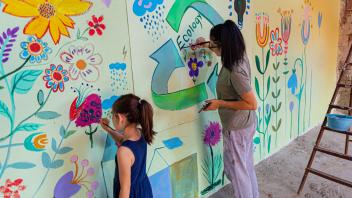To help children learn to read, you can show them many kinds of reading materials, such as books, newspapers, comics and magazines. Let them hear you read aloud. Encourage them to repeat what you read.
Reading with your child takes no special talent. It just takes loving your child, enjoying your activity together, and being committed to finding the time to do it.
- It’s important for you and your child to continue reading together even after he or she begins learning to read in school. This helps build your child’s good feelings about reading.
- Encourage your child to continue to read aloud. It could be to you, a brother or sister, or a neighbor. Some children will stumble or skip over a word. You can fill it in so they don’t feel overwhelmed. Ignore little mistakes. Do all you can to help the story flow.
- Check with your child’s teacher or a librarian to find books that are the right reading level.
- When your child likes a book, look for others by the same author or artist. Notice your child’s interests – rocks, dolls, dinosaurs or baseball cards. Try to find books, plays, comic or magazines on these favorite topics.
- Stop by the library often. Be sure that members of your family have library cards. You might enroll your child in a summer reading club. Let your child see you borrowing and reading books, magazines and newspapers.
- If you both go to a museum, the beach or on vacation, read magazines, pamphlets, maps or books together about these places before and after your trip.
- Most children, when they become good silent readers, will let you know when they prefer to read by themselves. Yet many will still enjoy that special shared time with you.
Citation
Reprinted with permission from the Parent Involvement area of National PTA’s website, www.pta.org.
